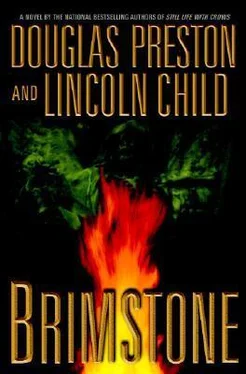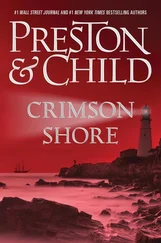Douglas Preston - Brimstone
Здесь есть возможность читать онлайн «Douglas Preston - Brimstone» весь текст электронной книги совершенно бесплатно (целиком полную версию без сокращений). В некоторых случаях можно слушать аудио, скачать через торрент в формате fb2 и присутствует краткое содержание. Жанр: Триллер, на английском языке. Описание произведения, (предисловие) а так же отзывы посетителей доступны на портале библиотеки ЛибКат.
- Название:Brimstone
- Автор:
- Жанр:
- Год:неизвестен
- ISBN:нет данных
- Рейтинг книги:5 / 5. Голосов: 1
-
Избранное:Добавить в избранное
- Отзывы:
-
Ваша оценка:
- 100
- 1
- 2
- 3
- 4
- 5
Brimstone: краткое содержание, описание и аннотация
Предлагаем к чтению аннотацию, описание, краткое содержание или предисловие (зависит от того, что написал сам автор книги «Brimstone»). Если вы не нашли необходимую информацию о книге — напишите в комментариях, мы постараемся отыскать её.
Brimstone — читать онлайн бесплатно полную книгу (весь текст) целиком
Ниже представлен текст книги, разбитый по страницам. Система сохранения места последней прочитанной страницы, позволяет с удобством читать онлайн бесплатно книгу «Brimstone», без необходимости каждый раз заново искать на чём Вы остановились. Поставьте закладку, и сможете в любой момент перейти на страницу, на которой закончили чтение.
Интервал:
Закладка:
Harriman took the proffered seat, hoping his hunch would prove correct: that Von Menck would give shape and voice to the devil-killings story. A typical scientist would merely debunk the business, while some crank satanist would have no credibility. What made Friedrich Von Menck perfect was that he straddled the gray area in between. While Von Menck's academic credentials were beyond reproach-doctor of philosophy from Heidelberg, doctor of medicine from Harvard, doctor of divinity from Canterbury-he had always made a specialty of mysticism, the paranormal, the unexplainable. His documentary on crop circles had aired on PBS to great acclaim, and it had been well done, salted with both skepticism and just the right frisson of the inexplicable. And, of course, his earlier documentary on the exorcisms in Cartagena, Spain, had won the Emmy. At the time, it had left even Harriman wondering-if only until the next commercial break-if there wasn't something to the idea of demonic possession.
Von Menck would provide more than just an opinion: he would provide a foundation, a launching pad, an engine. If Von Menck couldn't get this story into orbit, nobody could.
The doctor greeted him with courtesy, taking a seat in the leather chair opposite. Harriman liked him immediately. He was surprised to see that the compelling, almost magnetic personality projected on television was, in fact, real. It had a lot to do with the man's low, mellifluous voice and cool, ascetic features, with the prominent cheekbones and finely molded chin. Only one thing seemed to be missing. On television, Von Menck had frequently smiled-a raffish smile of wit and good humor, of a man who didn't take himself too seriously. It had the effect of keeping his rather technical investigations from getting too heavy. Now, however-though Von Menck was polite to a fault-the engaging smile was absent.
After a brief exchange of pleasantries, the doctor got right to the point. "Your message stated you wished to speak with me about the recent killings."
"That's right." Harriman reached into his pocket for his digital voice recorder.
"What your paper has referred to as the devil killings."
"Right." Did he detect the slightest hint of disdain, or disapproval, in the doctor's polite inflections? "Dr. Von Menck, I've come to see if you've framed an opinion on these murders."
Dr. Von Menck leaned back in his chair, tented his fingers, and looked carefully at Harriman. When at last he spoke, it was in very slow and measured tones. It almost seemed to Harriman the man had been considering the question long before he asked it. "Yes. As it happens, I do have an opinion."
Harriman placed the recorder on the arm of his chair. "Do you mind if I record this?"
Von Menck gave a small wave of permission. "I've been debating the wisdom of making my opinions public."
Harriman felt himself go cold. Oh, no, he thought. The guy's planning to do his own documentary on this. I'm about to get the royal shaft.
Then Von Menck sighed. "In the end, I decided people had a right to know. In that way, your phone call was fortuitous."
The chill was replaced by relief. Harriman leaned forward, snapped the recorder on. "Then perhaps you can tell me your thoughts, sir. Why these two men, why in such a manner, and why at this time?"
Von Menck sighed again. "The two men, and the manner, are of lesser importance. It's the timing that means everything."
"Explain."
Von Menck stood, walked toward one of the bookcases, opened it, and removed something. He placed it on the desk before Harriman. It was a cross section of a nautilus shell, its growth chambers spiraling outward from the center with beautiful regularity.
"Do you know, Mr. Harriman, what this shell has in common with the building of the Parthenon, the petals of a flower, and the paintings of Leonardo da Vinci?"
Harriman shook his head.
"It embodies that most perfect of nature's proportions, the golden ratio."
"I'm not sure I understand."
"It's the ratio obtained if you divide a line in such a way that the shorter segment is to the longer segment as the longer segment is to the entire line."
Harriman wrote this all down, hoping that he could figure it out later.
"The longer segment is 1.618054 times longer than the shorter segment. The shorter segment is 0.618054 percent of the longer. These two numbers, moreover, are exact reciprocals of each other, differing only in the first digit-the only two numbers to demonstrate that property."
"Right. Of course." Math had never been his strong suit.
"They have other remarkable properties. A rectangle constructed with sides of these two lengths is believed to be the most pleasing shape, called the golden rectangle. The Parthenon was built in this shape. Cathedrals and paintings were based on this shape. Such rectangles also have a remarkable property: if you cut a square off one side, you are left with a smaller golden rectangle of exactly the same proportions. You can keep cutting off squares and creating smaller golden rectangles ad infinitum."
"I see."
"Now, if you start with a large golden rectangle and reduce it, square by square, into an infinite series of smaller golden rectangles, and then connect the center of all these, you end up with a perfect natural logarithmic spiral. This is the spiral you see in the nautilus shell; in the packing of seeds into the head of the sunflower; in musical harmony; and indeed throughout all of nature. The golden ratio is a fundamental quality of the natural world."
"Yeah."
"This ratio is part of the basic structure of the universe. No one knows why."
Harriman watched as the doctor carefully put the shell back in the case and closed the glass front. Whatever he'd been expecting, this was not it. He was lost, and if he was lost, he knew that the Post 's readers would certainly be lost. What a waste of time. He'd have to escape at the earliest opportunity.
Von Menck stepped behind his desk and turned back to face the journalist. "Are you a religious man, Mr. Harriman?"
The question was so unexpected that, for a moment, Harriman did not know what to say.
"I don't necessarily mean in any organized sense: Catholic, Protestant, whatever. But do you believe there is a unifying force underlying our universe?"
"I'd never really thought about it," Harriman said. "I guess so." He had been raised Episcopalian, though he hadn't set foot inside a church-except for weddings and funerals-for almost twenty years.
"Then might you believe, as I do, that there is a purpose to our lives?"
Harriman shut off the tape recorder. Time to end this and get the hell out. If he wanted a lecture on religion, he could always call the Jehovah's Witnesses. "With all due respect, Doctor, I don't see what this has to do with the two recent deaths."
"Patience, Mr. Harriman. My proof is complex, but the conclusion will, to use a popular expression, blow your mind."
Harriman waited.
"Let me explain. All my life, I have been a student of the mysterious, the unexplained. Many of these mysteries I have solved to my own satisfaction. Others-oftentimes the greatest-remain dark to me." Von Menck took a piece of paper from his desk, wrote on it briefly, then placed it before Harriman:
3243
1239
"Those two numbers"-and he tapped the page-"have always represented the biggest mysteries of all to me. Do you recognize them?"
Harriman shook his head.
"They mark the single two greatest cataclysmic events ever to befall human civilization. In 3243B.C. , the island of Santorini explodes, generating tidal waves that wipe out the great Minoan civilization of Crete and devastate the entire Mediterranean world. This is the source of both the legend of Atlantis and the Great Flood. And 1239B.C. is when the twin cities of Sodom and Gomorrah were reduced to ash by a rain of ruin from the sky."
Читать дальшеИнтервал:
Закладка:
Похожие книги на «Brimstone»
Представляем Вашему вниманию похожие книги на «Brimstone» списком для выбора. Мы отобрали схожую по названию и смыслу литературу в надежде предоставить читателям больше вариантов отыскать новые, интересные, ещё непрочитанные произведения.
Обсуждение, отзывы о книге «Brimstone» и просто собственные мнения читателей. Оставьте ваши комментарии, напишите, что Вы думаете о произведении, его смысле или главных героях. Укажите что конкретно понравилось, а что нет, и почему Вы так считаете.












